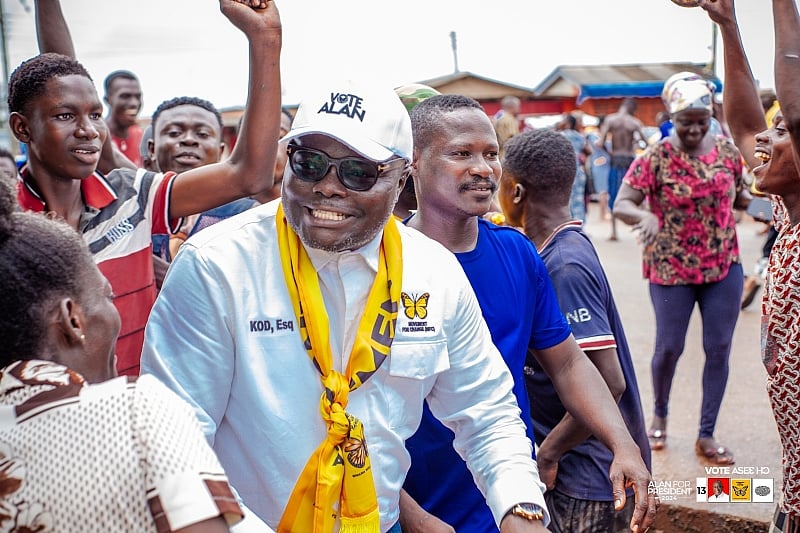In recent statements following his appointment as the running mate of the Afrafranto Movement for Change, Mr. Kwame Owusu Danso (KOD) has sharply criticized the entrenched political duopoly in Ghana, dominated by the National Democratic Congress (NDC) and the New Patriotic Party (NPP). He argues that this two-party system has led to widespread impoverishment in the country and that the Ghanaian media, instead of acting as a gatekeeper of democracy, has become complicit in supporting this imbalance. KOD’s remarks come in the context of a Caravan Campaign Tour in the Central Region, where he expressed deep concern about the political landscape of Ghana, asserting that it has been largely shaped by the activities of these two parties over the past three decades.
KOD’s critique extends to the broader socio-economic conditions in Ghana, where despite abundant human and natural resources, the nation finds itself repeatedly turning to international financial institutions like the International Monetary Fund (IMF) for assistance—a situation he describes as intolerable. He conveys a sense of urgency and frustration, stating that the issues facing Ghana are not due to a lack of resources, but rather the result of a dysfunctional political system that has been deliberately crafted to serve the interests of a few, leaving the majority sidelined and struggling. His emotional appeal underscores a belief that sustainable governance in Ghana requires a focus on leveraging the nation’s talents and resources more effectively.
Highlighting the role of the media, KOD emphasizes that it has played a critical part in entrenching the political status quo, enabling an “eight-year cycle of state capture” between the NPP and NDC. He criticizes media organizations for only promoting discussions that revolve around these two major political parties and for ignoring the possibility of independent candidates or alternative political movements. KOD believes that this narrow perspective has severely limited the overall political discourse in the country, making it almost impossible for other talented individuals not aligned with these parties to rise to leadership positions. He calls this situation unsustainable, claiming it effectively stifles innovation and potential contributions from some of the nation’s brightest minds.
KOD’s analysis of the consequences of Ghana’s entrenched political duopoly is stark. He describes the system as a “winner-takes-all” model, which has created a political environment where power alternates between the NPP and NDC while failing to address the persistent poverty faced by the majority of Ghanaians. He lays part of the blame on the media, which he believes unwittingly perpetuates this cycle by failing to challenge the status quo or promote alternative narratives that could lead Ghana towards better governance. KOD’s assertion that Ghana cannot afford to continue on this path echoes a broader concern about the need for reform within the political and media landscape to facilitate true democracy and development.
In his passionate address, KOD implores the media to re-evaluate its role as the “fourth estate” of democracy. He argues that without a shift in media practices, Ghana will likely remain trapped in the prevailing cycle of underdevelopment. His plea is not merely a critique; it is a call to action for both media organizations and the electorate to support new policies, ideas, and leadership that can enhance the country’s prospects for growth. By addressing the existing failures of the political system, KOD envisions a future where all citizens, particularly the youth, can participate in shaping the nation’s destiny rather than being confined to the narratives dictated by the political elite.
As part of the Afrafranto Movement for Change, KOD, alongside his presidential candidate Alan Kyerematen, has begun an active campaign to engage with the youth of Ghana. They aim to promote a transformative agenda that not only seeks to address the immediate political concerns but also fosters long-term developmental goals. KOD’s comments serve as both a diagnosis of the current political malaise and a blueprint for potential reforms that could steer Ghana away from the recurring cycles of poverty and toward a more inclusive and equitable future. His campaign is positioned as a necessary step towards breaking away from the entrenched political models that have limited the country’s progress for far too long, signaling a renewed hope for genuine political transformation in Ghana.
In conclusion, the situation KOD describes mirrors broader global trends where entrenched political systems often suppress emerging voices and ideas. His critique prompts a critical analysis of the interdependencies between media, politics, and social development in Ghana—a relationship that requires reflection and action if the nation is to transcend its current challenges. With his recent appointment and ongoing campaign, KOD is poised to advocate for a system that values diverse contributions and democratic participation, underlining the importance of equitable governance in harnessing Ghana’s full potential. The urgency of his message signals a pivotal moment in Ghana’s political discourse, as the nation grapples with the need for change in order to secure a prosperous future for all its citizens.














